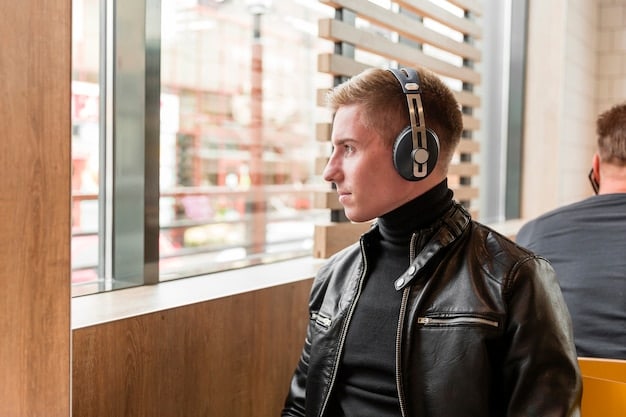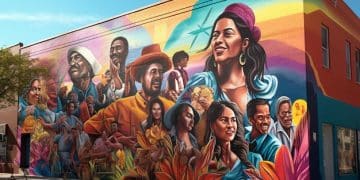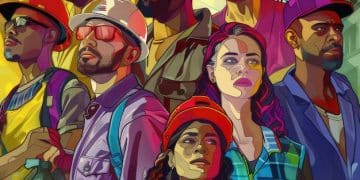Hip Hop and Mental Health: Breaking the Stigma

The hip hop community is increasingly addressing mental health, with artists openly sharing their struggles to effectively challenge stigma and foster a culture of wellness for their global audience.
In a world often seen through the lens of fame and artistic expression, the conversation around Hip Hop and Mental Health: How Artists Are Breaking the Stigma and Promoting Wellness is gaining crucial momentum. This dialogue marks a pivotal shift, as beloved figures within hip hop begin to peel back the layers of public persona to reveal deeply human struggles. As a growing number of artists bravely share their personal journeys, they are not only normalizing discussions surrounding mental health but also actively building a supportive community within the genre.
The Evolution of Mental Health Discourse in Hip Hop
For decades, hip hop music has served as a powerful narrative platform, reflecting societal realities and personal experiences. Initially, discussions about mental well-being were often veiled in metaphor or implicitly understood through themes of struggle and resilience. The genre, rooted in challenging oppresssion and expressing raw emotions, naturally touched upon the psychological burdens faced by its artists and audience, though seldom explicitly labeling them as mental health issues.
This subtle acknowledgement has gradually given way to more direct and open conversations. The evolution stems from a combination of changing societal views on mental health and the increasing willingness of artists to be vulnerable. What was once a taboo topic, often associated with weakness or shame, is now being reframed as a vital component of holistic well-being, thanks to the courage of pioneering voices within the culture.
Early Expressions and Undercurrents
Early hip hop often contained implicit references to trauma, anxiety, and depression, reflecting the challenging environments many artists navigated. Listeners, particularly those from similar backgrounds, intuitively recognized these themes. However, the language used was typically one of struggle and survival, not clinical diagnosis.
- Songs of the late 80s and early 90s depicted urban anxieties and systemic pressures.
- Artists often used storytelling to process poverty, violence, and identity struggles.
- The emphasis was on strength and overcoming obstacles, sometimes at the expense of addressing internal pain.
This narrative of resilience, while empowering, inadvertently contributed to the stigma, suggesting that vulnerability was counterproductive or shameful. The expectation was often to “tough it out” rather than seek external help, a deeply ingrained cultural trait that hip hop both mirrored and, in some ways, amplified. Over time, however, a sense of collective consciousness began to form, recognizing the need for more overt discussion.
The Shift Towards Open Dialogue
The turning point largely coincides with a broader societal re-evaluation of mental health, amplified by social media platforms that allow for more direct and unfiltered communication. Artists, armed with unprecedented access to their fan base, found themselves in a unique position to lead this charge. They observed the positive reception to their tentative forays into personal vulnerability, which encouraged deeper dives into topics once considered off-limits.
This shift wasn’t linear; it involved gradual steps by various artists who cumulatively built a foundation for change. From explicit mentions of therapy to discussing diagnoses like depression and anxiety, the lexicon of mental health has slowly but surely found its way into hip hop lyrics and public discourse, fostering an environment where seeking help is becoming less of a secret and more of a celebrated act of self-care. This ongoing transformation showcases the genre’s remarkable adaptability and its enduring power to shape cultural conversations.
Key Artists Leading the Conversation
The current landscape of hip hop mental health discourse owes much to specific artists who have courageously stepped forward to share their battles. Their honesty resonates deeply with fans, dissolving barriers and demonstrating that even those who appear to have it all face internal struggles. These pioneers have not only normalized the conversation but have also provided tangible examples of navigating mental health challenges.
Their contributions often extend beyond personal revelation, inspiring others within the industry to follow suit and encouraging fans to prioritize their own well-being. These artists often use their platforms not just to articulate their pain but also to advocate for greater awareness and accessibility to mental health resources. They are effectively transforming personal narratives into a collective movement for change.
Kendrick Lamar: Poetic Vulnerability
Kendrick Lamar stands out for his profoundly introspective and often unsettling exploration of mental states within his music. His albums, notably “To Pimp a Butterfly” and “DAMN.”, delve into themes of depression, generational trauma, and the psychological weight of fame and racial identity. Lamar’s lyrical prowess allows him to weave complex emotional tapestries that resonate with listeners on a very personal level.
- Explored thoughts of suicide and self-worth on “u” from “To Pimp a Butterfly.”
- Dealt with survivor’s guilt and existential dread throughout his discography.
- His narratives often depict the internal conflict of a young Black man grappling with societal pressures and personal demons.
Lamar’s work provides a raw, unfiltered look into the darkest corners of his mind, making his struggles relatable and validating for many. He approaches these topics with a poetic intensity that forces listeners to confront uncomfortable truths, both his own and, by extension, their own. His influence has been pivotal in showing that profound art can emerge from deep vulnerability.
Kid Cudi: Openness and Therapy Advocacy
Kid Cudi has been one of the most vocal advocates for mental health in hip hop, openly discussing his battle with depression and anxiety. His public statements and music often directly address his struggles, encouraging his audience to seek professional help. His commitment to transparency has made him a beacon of hope for many navigating similar issues.

Cudi’s impact is significant because he not only reveals his pain but also actively champions therapeutic interventions. He has spoken candidly about checking himself into rehab for depression and suicidal urges, dismantling the notion that seeking help is a sign of weakness. This proactive approach has made him a role model for prioritizing mental wellness, setting a crucial precedent for other artists and their fans. His music, particularly “Man on the Moon: The End of Day,” became an anthem for those feeling isolated in their struggles, fostering a sense of shared experience and understanding.
Logic: Addressing Suicide Prevention
Logic, through his music and public advocacy, has made suicide prevention a central theme of his career. His song “1-800-273-8255,” featuring Alessia Cara and Khalid, directly references the National Suicide Prevention Lifeline and became a global anthem for mental health awareness. The song’s massive success brought the conversation to an unprecedented mainstream audience, saving lives in the process.
Logic has often shared his own history of depression and anxiety, using it as a foundation for his message of hope and resilience. He consistently emphasizes the importance of community and seeking help, often pausing during concerts to speak directly to fans about their mental well-being. His dedication extends beyond artistic expression, positioning him as a significant public health advocate. By making direct calls to action and sharing personal anecdotes, Logic effectively bridges the gap between artistic expression and real-world impact, proving that music can indeed be a powerful tool for positive social change.
The Impact on Fans and the Community
The candidness of hip hop artists regarding their mental health struggles has had a profound ripple effect on their fans and the broader community. When an idol or beloved figure opens up about vulnerability, it validates the experiences of countless individuals who might be silently suffering. This validation can be a powerful catalyst for breaking down internal and external stigmas, encouraging fans to acknowledge their own challenges and seek help.
Artists act as cultural compasses, and their willingness to discuss traditionally taboo subjects provides a crucial permission structure for others. Beyond individual impact, this growing transparency fosters a sense of collective understanding and empathy within the hip hop community. Fans connect not just through shared musical tastes but also through shared human experiences of pain, healing, and growth, thereby strengthening community bonds around these vital topics.
Normalizing Mental Health Conversations
One of the most significant impacts has been the normalization of mental health conversations. For a long time, talking about depression, anxiety, or therapy was considered off-limits in many communities, particularly those where hip hop thrives. Artists’ openness challenges this harmful silence.
- Fans feel less alone when their favorite artists share similar struggles.
- The language of therapy and self-care is becoming more common in everyday discourse.
- It reduces the shame associated with seeking professional help.
This normalization extends beyond the individual listener. It permeates social media discussions, fan forums, and even mainstream media, creating a more accepting environment for difficult conversations. When complex emotional states are discussed on popular albums or in high-profile interviews, topics previously relegated to hushed whispers become part of a public, evolving dialogue, reshaping cultural attitudes one candid statement at a time.
Encouraging Help-Seeking Behavior
Beyond normalizing discussion, artists’ mental health advocacy directly encourages help-seeking behavior. Many songs or public statements include explicit calls to action, providing resources and emphasizing that help is available and effective. This direct encouragement is vital for individuals who may feel isolated or unsure where to turn.
When an artist like Logic directly promotes suicide prevention hotlines, or when Kid Cudi speaks about the benefits of therapy, it demystifies the process and makes professional help seem more accessible and less intimidating. This shift is crucial, moving beyond mere awareness to active promotion of solutions. It empowers listeners to take concrete steps towards their own well-being, fostering a culture where asking for help is seen as a sign of strength, not weakness. This proactive approach by artists is directly translating into real-world positive outcomes for their audience, saving lives and improving quality of life.
Challenges and Criticisms
While the growing discussion around mental health in hip hop is largely positive, it’s not without its challenges and criticisms. The very public nature of artists’ revelations can sometimes lead to superficial engagement or even exploitation. Navigating the line between genuine advocacy and performative allyship remains a concern, along with the potential for misinterpretation or backlash from traditionalist elements within the culture.
Furthermore, the industry itself, with its relentless pressures and high-stakes environment, can exacerbate mental health issues even as artists try to address them. The demand for constant output, touring, and public scrutiny places immense strain on individuals, highlighting systemic issues that extend beyond individual artistic expression. Addressing these deeper structural challenges is as crucial as fostering open dialogue among artists and fans.
Authenticity vs. Performance
One significant challenge is discerning authenticity. In an era where “vulnerability” can sometimes be commodified, there’s a risk that mental health discussions become another trend or marketing tool. Fans and critics alike are discerning, and detecting genuine struggle versus calculated performance is a constant challenge. When authenticity is questioned, it can undermine the credibility of the entire movement.

The fine line between sharing one’s journey for the benefit of others and oversharing for attention can be blurry. This also extends to the industry itself; authentic support systems need to be in place for artists, rather than simply encouraging them to speak out without providing necessary resources or safe spaces. Ensuring that mental health advocacy is rooted in genuine care and not just public relations requires constant vigilance and a commitment to systemic change within the music industry’s infrastructure.
Industry Pressures and Environment
The hip hop industry operates at a breakneck pace, often demanding constant creativity, relentless touring, and extreme personal sacrifice. This high-pressure environment can be detrimental to mental well-being, even for artists who are actively speaking out against stigma. The expectations placed on artists to maintain an image of invincibility, coupled with financial pressures and public scrutiny, can ironically exacerbate underlying mental health issues.
- Demands for constant output can lead to burnout and creative blocks.
- Isolation during touring can detach artists from support systems.
- Online harassment and scrutiny from fans and media contribute to anxiety.
Therefore, while artists are doing an admirable job breaking the stigma, there’s also a critical need for the industry itself to adopt more supportive practices. This includes creating safer spaces for artists to discuss their struggles internally, providing access to mental health professionals, and re-evaluating the relentless schedules that contribute to burnout. Addressing these systemic pressures is a crucial step towards truly fostering wellness within the hip hop community beyond just public declarations.
Future Directions and Hopes
Looking ahead, the trajectory for mental health in hip hop suggests continued growth and deeper integration. The foundation has been laid by pioneering artists, and the conversation is now firmly established. The future will likely see a move beyond just talk, towards more concrete actions, resources, and systemic changes within the music industry and the broader community it influences.
Greater collaboration, innovative approaches to help-seeking, and targeted interventions are all part of this hopeful future. The aim is to create an environment where mental wellness is not just acknowledged but actively championed, leading to healthier artists and healthier communities through the unifying power of hip hop and shared vulnerability.
Integration into Music and Philanthropy
We can expect to see mental health themes becoming even more seamlessly integrated into mainstream hip hop music, moving beyond mere mentions to more nuanced and layered artistic explorations. This deeper integration can help destigmatize the topic further by normalizing it within the artistic fabric of the genre itself. Additionally, artists are increasingly leveraging their platforms for philanthropic efforts.
This includes establishing foundations, partnering with mental health organizations, and funding initiatives that bring therapy and support services directly to underserved communities. From free therapy sessions to mental health workshops for young people, these ventures transform awareness into tangible support. The long-term impact of such philanthropic efforts is immense, ensuring that the dialogue around mental health translates into accessible, life-changing resources for those who need them most.
Increased Support Systems within the Industry
A crucial development for the future lies in the establishment of more robust support systems within the music industry. As more artists speak out, the industry response needs to evolve beyond PR statements to concrete, accessible resources for talent development. This means providing confidential access to therapists, mental health coaches, and wellness programs designed specifically for the unique demands of a career in music.
Record labels, management companies, and touring agencies have a responsibility to prioritize artist well-being, implementing policies that prevent burnout and promote mental stability. From ensuring adequate rest periods during tours to providing mental health sabbaticals, these systemic changes are vital. Investing in artist mental health is not only an ethical imperative but also a strategic one, fostering longevity and creativity within the industry for years to come. This shift from reactive crisis management to proactive wellness support is perhaps the most significant hope for the future.
The Role of Education and Awareness
Education and ongoing awareness campaigns are paramount to sustaining and deepening the impact of mental health advocacy within hip hop. While artists opening up is powerful, structured educational efforts can provide the necessary framework for understanding, identifying, and addressing mental health challenges effectively. This involves reaching broad audiences through various channels, from schools to online platforms, by providing nuanced information that dispels myths and promotes healthy coping mechanisms.
Educating both artists and their fan bases on the complexities of mental health, available resources, and the importance of compassionate understanding will ensure that the conversation continues to evolve constructively. This proactive approach strengthens the community’s collective well-being and empowers individuals with the knowledge to support themselves and others effectively, making the fight against stigma an informed and collective effort.
Community Engagement and Outreach
Effective community engagement is vital for translating broad awareness into tangible action. This involves hip hop artists and organizations actively participating in outreach programs, workshops, and speaking engagements that bring mental health resources directly to communities that may lack access or information. These initiatives can range from school-based programs to public health campaigns at local community centers, all utilizing the cultural influence of hip hop to deliver their message.
- Hosting free mental health screenings at concerts or community events.
- Developing culturally sensitive mental health resources tailored to urban youth.
- Partnering with local mental health professionals for panel discussions and Q&A sessions.
Such direct engagement helps democratize mental health support, bypassing traditional barriers and building trust within communities that might otherwise be skeptical or uninformed about formal aid. By fostering safe spaces for dialogue and providing practical tools, hip hop artists and their allies are enabling a more informed and empowered community to take charge of their mental well-being, demonstrating that true change happens at the grassroots level, facilitated by relatable voices.
Educating the Next Generation
Ensuring the longevity of this positive shift requires a concerted effort to educate the next generation. Incorporating mental health literacy into educational curricula, particularly in schools within communities where hip hop culture is dominant, can equip young people with crucial tools and understanding from an early age. This includes teaching emotional regulation, stress management, and the importance of seeking help when needed. Furthermore, encouraging aspiring artists to prioritize their mental health as part of their career development is essential.
Mentorship programs where established artists share their experiences and advice on maintaining mental well-being can be incredibly impactful. By instilling these values early, hip hop can cultivate a new generation of artists and fans who view mental health as an integral part of success and overall well-being. This investment in generational education is the cornerstone for a truly progressive and sustained cultural shift, ensuring that the legacy of breaking mental health stigma continues to flourish for decades to come, creating a more compassionate and informed future for all.
| Key Aspect | Brief Description |
|---|---|
| 🎤 Artist Openness | Pioneering hip hop artists are sharing personal mental health struggles to break stigma. |
| 🌟 Community Impact | Their vulnerability normalizes conversations and encourages fans to seek help. |
| 🛠️ Industry Support | Calls for more robust industry mental health support systems are growing. |
| 📚 Future & Education | Ongoing education and philanthropic efforts will deepen well-being within the culture. |
Frequently Asked Questions About Hip Hop and Mental Health
▼
Hip hop artists are breaking stigma by openly sharing their personal struggles with mental health conditions like depression and anxiety. Through their music, interviews, and social media, they normalize these conversations, showing fans that it’s normal to face such challenges and empowering them to seek professional help without shame.
▼
Kendrick Lamar, Kid Cudi, and Logic are some of the most prominent artists. Kendrick Lamar delves into complex internal struggles in his lyrical narratives, Kid Cudi openly discusses his therapy journey, and Logic notably used his song “1-800-273-8255” to promote suicide prevention and directly referenced the National Suicide Prevention Lifeline.
▼
Artists’ openness profoundly impacts fans by validating their own experiences, making them feel less alone, and normalizing mental health discussions. It reduces the shame associated with seeking help and encourages a more empathetic environment where emotional vulnerability is seen as strength, often inspiring fans to seek professional support.
▼
Yes, challenges include distinguishing genuine advocacy from performance, and the intense industry pressures that can exacerbate artists’ mental health issues. There’s also the need for more robust internal support systems within the music industry to ensure artists not only speak out but also receive the care they need.
▼
The future hopes include deeper integration of mental health themes into music, increased philanthropic efforts by artists to provide resources to communities, and the development of stronger, more proactive support systems within the music industry. The goal is to move beyond mere discussion towards tangible, widespread wellness promotion.
Conclusion
The journey of hip hop from veiled references to mental struggles to overt advocacy is a testament to its dynamic and reflective nature. Artists are not merely entertainers; they are profound cultural figures whose vulnerability has ignited a vital conversation, eroding stigma and fostering a new era of wellness within their community. As hip hop continues to evolve, its powerful voice increasingly serves as a catalyst for collective healing and authentic engagement, proving that shared human experiences, even the most difficult ones, can unite and empower us all.





